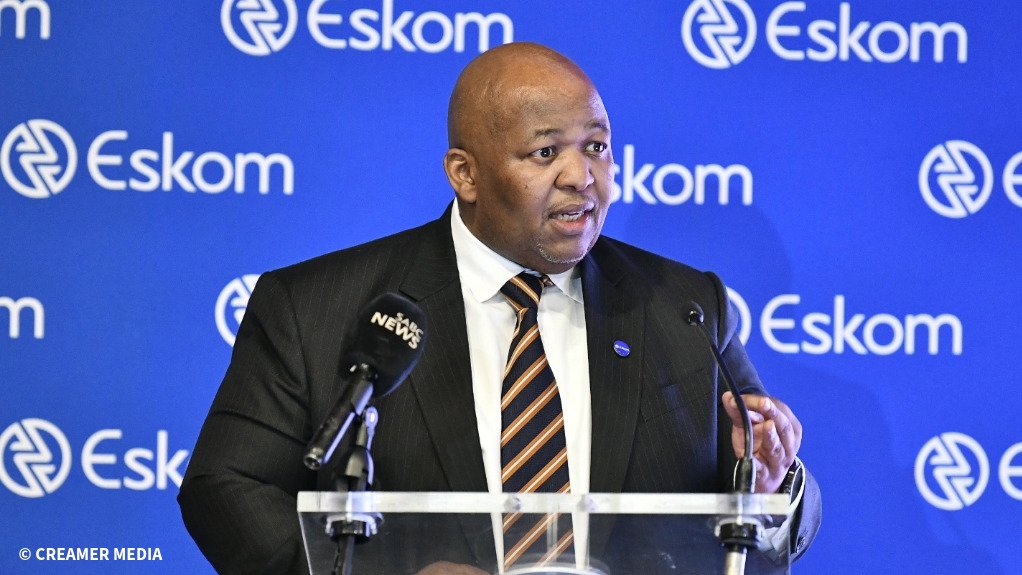Marokane wants South Africa’s grid plan to be coupled to larger regional plan
Eskom CEO Dan Marokane has called for South Africa’s Transmission Development Plan (TDP) to be complemented by a “regional TDP” to support the development of the grid infrastructure required to enable expanded electricity trade across the Southern African Power Pool.
Speaking at a B20 side event on the just energy transition hosted by Standard Bank, Marokane reported that the Department of Electricity and Energy, which is Eskom's shareholder department, was urging Eskom to adopt a regionally focused strategy now that its operational problems had eased.
He reported that Eskom’s improved energy availability factor had already allowed it to support several Zambian mining operations with electricity, but that limited transmission infrastructure remained a major constraint.
“Regional integration must now be part of our strategy,” he said, adding that a regional TDP could help raise electrification penetration and unlock the territory’s mining potential as demand for critical minerals increased.
Standard Bank Corporate and Investment Banking head of power Rentia van Tonder also underlined the urgency of building regional grid infrastructure for catalysing growth across Southern Africa, particularly in countries facing severe electricity deficits.
Also citing recent projects by the bank in Zambia, she said innovative partnerships that combined renewables and battery storage with new financing models had been key to powering certain mining operations. However, access to regional electricity sources through an expanded grid would improve reliability and lower costs.
These regional investments she argued were required in addition to South Africa’s plan, as outlined in the TDP, to construct 14 500 km of new powerlines and 133 000 MVA of additional transformers by 2034.
The National Transmission Company South Africa, which is an Eskom subsidiary, usually updates the TDP yearly.
However, it has received a two-year exemption from the regulator from doing so to enable it to align the grid plan with the recently released Integrated Resource Plan 2025, and potentially to consider integrating regional interconnectors.
It has been estimated that some R440-billion will be required over the coming ten years to implement the TDP, including through private-sector participation in the form of the Independent Transmission Project (ITP) procurement programme.
The request for proposals for the first ITP procurement phase, in which 1 164 km of powerlines and 2 630 MVA of transformation capacity across seven corridors is to be allocated, has been delayed until the second half of 2026.
This, to allow for the finalisation of the Credit Guarantee Vehicle (CGV), which will allow for the procurement to proceed in the absence of government guarantees.
Finance Minister Enoch Godongwana announced during his Medium-Term Budget Policy Statement that the South African government would contribute R2-billion to capitalise the CGV, but would be a minority shareholder in what would be an independent, non-life insurance entity with an initial capitalisation of $500-million (about R8.5-billion).
The entity would be governed by an independent board and regulated by the Prudential Authority, with development finance institutions expected to own most of the shares.
Van Tonder underlined the importance of the CGV for attracting both private capital and commercial lenders to large-scale grid projects.
“It’s far more than just crowding in local banks,” she said. “The CGV can unlock cheaper capital, lower the fiscal burden, create longer loan tenors and reduce the overall cost of capital through blended-finance structures.”
Unlocking electricity infrastructure is also a key theme of the B20 South Africa Energy Mix and Just Transition Task Force report prepared ahead of the B20 gathering and G20 Leaders’ Summit.
Task force chairperson Daniel Mminele said that modernising grid infrastructure across Africa was one of three recommendations made in the report.
The other two related to implementing financial models that were supportive of national energy transitions being pursued by African countries and moving beyond mineral extraction to build local industries in energy technology, processing, and services.
“The global energy transition is reshaping supply chains, markets and labour forces, and will unlock a projected $11-trillion in value by 2040, and create nearly 90-million jobs by 2050.
“But, unfortunately, too much of that value will bypass Africa if we are not correctly positioned.
“We need to overcome our current situation where Africa remains stuck in extraction and choked by infrastructure gaps,” Mminele averred.
He said the task force’s call to action included: aligning national and regional master plans to unlock cross-border transmission and trade; embedding digital design and modular upgrades for accelerated deployment and climate resilience; and accelerating permitting and delivery capacity at local level so that bankable projects could move ahead.
Article Enquiry
Email Article
Save Article
Feedback
To advertise email advertising@creamermedia.co.za or click here
Announcements
What's On
Subscribe to improve your user experience...
Option 1 (equivalent of R125 a month):
Receive a weekly copy of Creamer Media's Engineering News & Mining Weekly magazine
(print copy for those in South Africa and e-magazine for those outside of South Africa)
Receive daily email newsletters
Access to full search results
Access archive of magazine back copies
Access to Projects in Progress
Access to ONE Research Report of your choice in PDF format
Option 2 (equivalent of R375 a month):
All benefits from Option 1
PLUS
Access to Creamer Media's Research Channel Africa for ALL Research Reports, in PDF format, on various industrial and mining sectors
including Electricity; Water; Energy Transition; Hydrogen; Roads, Rail and Ports; Coal; Gold; Platinum; Battery Metals; etc.
Already a subscriber?
Forgotten your password?
Receive weekly copy of Creamer Media's Engineering News & Mining Weekly magazine (print copy for those in South Africa and e-magazine for those outside of South Africa)
➕
Recieve daily email newsletters
➕
Access to full search results
➕
Access archive of magazine back copies
➕
Access to Projects in Progress
➕
Access to ONE Research Report of your choice in PDF format
RESEARCH CHANNEL AFRICA
R4500 (equivalent of R375 a month)
SUBSCRIBEAll benefits from Option 1
➕
Access to Creamer Media's Research Channel Africa for ALL Research Reports on various industrial and mining sectors, in PDF format, including on:
Electricity
➕
Water
➕
Energy Transition
➕
Hydrogen
➕
Roads, Rail and Ports
➕
Coal
➕
Gold
➕
Platinum
➕
Battery Metals
➕
etc.
Receive all benefits from Option 1 or Option 2 delivered to numerous people at your company
➕
Multiple User names and Passwords for simultaneous log-ins
➕
Intranet integration access to all in your organisation




















